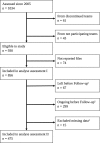Improved Intelligence, Literacy and Mathematic Skills Following School-Based Intervention for Children in Foster Care
- PMID: 32390912
- PMCID: PMC7194231
- DOI: 10.3389/fpsyg.2020.00718
Improved Intelligence, Literacy and Mathematic Skills Following School-Based Intervention for Children in Foster Care
Abstract
Interventions aimed at improving school performance for children in foster care are few and are generally not implemented. By preventing failure in school, the prospect of reducing the risk for future poor health, substance abuse, unemployment, and other detrimental social conditions are met. This paper focuses on the change of preconditions for compulsory school performance in out-of-home care children, following an intervention called "Skolfam" that aims to improve school performance by individual assessments and school-based interventions. In this study, data were compiled from prospective repeated tests of 475 children in foster care in Sweden. Educational preconditions were analysed for compulsory school performance, such as intelligence (WISC-IV), psychosocial (SDQ) and adaptive behavior (ABAS-II), literacy (Reading Chains) and mathematical skills (Magne Mathematic Diagnoses) before and after the first 2 years of the "Skolfam" intervention. All tests were age-standardized and performed by experienced professionals. The results showed improved skills in complex aspects of literacy, mathematics, and cognitive performance, but no improvement in less complex literacy skills, adaptive behavior or mental health symptoms. In conclusion, higher-order cognitive functions can develop positively when appropriate school support is provided. Affective function, adaptive behavior, and psychosocial well-being present a more pervasive challenge for children in foster care. Implications for future research, practice in social services, and school is that further development of methods to aid future prospects for children in out-of-home care should aim to improve both cognitive higher-order executive-, and affective functions.
Keywords: assessment; intelligence; intervention; literacy; mathematics; out-of-home care.
Copyright © 2020 Tordön, Bladh, Sydsjö and Svedin.
Figures

Similar articles
-
[What support of young presenting a first psychotic episode, when schooling is being challenged?].Encephale. 2017 Dec;43(6):570-576. doi: 10.1016/j.encep.2017.10.001. Epub 2017 Nov 8. Encephale. 2017. PMID: 29128195 Review. French.
-
A process for developing community consensus regarding the diagnosis and management of attention-deficit/hyperactivity disorder.Pediatrics. 2005 Jan;115(1):e97-104. doi: 10.1542/peds.2004-0953. Pediatrics. 2005. PMID: 15629972
-
Literacy skills in primary school-aged children with pragmatic language impairment: a comparison with children with specific language impairment.Int J Lang Commun Disord. 2011 May-Jun;46(3):334-47. doi: 10.3109/13682822.2010.500316. Int J Lang Commun Disord. 2011. PMID: 21575074 Clinical Trial.
-
Home literacy environment: characteristics of children with cerebral palsy.Int J Lang Commun Disord. 2009 Nov-Dec;44(6):917-40. doi: 10.1080/13682820802464759. Int J Lang Commun Disord. 2009. PMID: 19105068
-
Interventions for children with dyslexia: A review on current intervention methods.Med J Malaysia. 2018 Oct;73(5):311-320. Med J Malaysia. 2018. PMID: 30350811 Review.
Cited by
-
Predictors of educational failure at 16 and 19 years of age-SESBiC longitudinal study.PLoS One. 2023 Jan 11;18(1):e0279531. doi: 10.1371/journal.pone.0279531. eCollection 2023. PLoS One. 2023. PMID: 36630369 Free PMC article.
References
-
- Berlin M., Vinnerljung B., Hjern A. (2011). School performance in primary school and psychosocial problems in young adulthood among care leavers from long term foster care. Child. Youth Serv. Rev. 33 2489–2497. 10.1016/j.childyouth.2011.08.024 - DOI
-
- Bjornsdotter A., Enebrink P., Ghaderi A. (2013). Psychometric properties of online administered parental strengths and difficulties questionnaire (SDQ), and normative data based on combined online and paper-and-pencil administration. Child Adolescent Psychiatry Ment. Health 7:40. 10.1186/1753-2000-7-40 - DOI - PMC - PubMed
LinkOut - more resources
Full Text Sources
Miscellaneous

